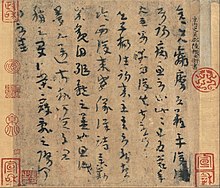Lu Ji 陸機 | |
|---|---|
| Born | Family name: Lu (陸) Given name: Ji (機) Courtesy name: Shiheng (士衡) 261 |
| Died | c.November 303 (aged 42) |
| Occupation | Essayist, military general, politician, writer |
| Notable works |
|
| Relatives | |
Lu Ji (c. 261 – c. November 303[1]), courtesy name Shiheng, was a Chinese essayist, military general, politician, and writer who lived during the late Three Kingdoms period and Jin dynasty of China. He was the fourth son of Lu Kang, a general of the state of Eastern Wu in the Three Kingdoms period, and a grandson of Lu Xun, a prominent general and statesman who served as the third Imperial Chancellor of Eastern Wu.
Life
[edit]Lu Ji was related to the imperial family of the state of Eastern Wu. He was the fourth son of the general Lu Kang, who was a maternal grandson of Sun Ce, the elder brother and predecessor of Eastern Wu's founding emperor, Sun Quan.[2] His paternal grandfather, Lu Xun, was a prominent general and statesman who served as the third Imperial Chancellor of Eastern Wu. After the Jin dynasty conquered Eastern Wu in 280 and killed two of his brothers, Lu Ji and his brother Lu Yun fled to Hua Ting in exile.[2] While in exile, Lu wrote Dialectic of Destruction on the fall of the Wu empire.[2] In 290, Lu and his brother moved to the Jin imperial capital, Luoyang.[2] He served as a writer under the Jin government and was appointed president of the imperial academy.[2] In 296, he was appointed to a military position.[2] Lu's army suffered major casualties in a battle against Sima Ai in November 303 as part of the War of the Eight Princes.[2] Shortly thereafter, Lu, his sons, and his two brothers were charged with treason and executed.[2][3]
Writings
[edit]
Lu Ji wrote much lyric poetry but is better known for writing fu, a mixture of prose and poetry. He is best remembered for the Wen fu (文賦; On Literature), a piece of literary criticism that discourses on the principles of composition. Achilles Fang commented:
The Wen-fu is considered one of the most articulate treatises on Chinese poetics. The extent of its influence in Chinese literary history is equaled only by that of the sixth-century The Literary Mind and the Carving of Dragons of Liu Hsieh. In the original, the Wen-fu is rhymed, but does not employ regular rhythmic patterns: hence the term "rhymeprose."[4]
English translations of the Wen fu were done by E.R. Hughes and Achilles Fang.[2] Chen Shixiang translated Wen fu into verse because, although the piece was rightly called the beginning of Chinese literary criticism, Lu Ji wrote it as poetry.[5] Poets influenced by Wen fu include Ezra Pound, Gary Snyder, Howard Nemerov, Eleanor Wilner, Carolyn Kizer,[2] and Olav H. Hauge.[6]
Lu Ji is also the writer of the oldest extant work of Chinese calligraphy, a short letter to his friends that has been named the Pingfutie (Consoling Letter).[7]
See also
[edit]Notes
[edit]- ^ Both vol. 85 of Zizhi Tongjian and Emperor Hui's biography in Jin Shu indicate that Lu Ji was defeated on the wu'shen day of the 10th month of the 2nd year of the Tai'an era; the date corresponds to 3 Nov 303 in the Julian calendar. The same volume in Tongjian and Lu Ji's biography in Jin Shu indicate that he was executed shortly after this defeat. Thus, Lu Ji likely died in November 303. His biography in Jin Shu says that he was 43 (by East Asian reckoning) when he died.
- ^ a b c d e f g h i j Lu, Ji (1991). The Art of Writing: Lu Chi's Wen Fu. Sam Hamill, trans. Milkweed Editions. pp. 11–26. ISBN 0-915943-62-X. OCLC 22890074.
- ^ Weinberger, Eliot, ed. (2003). The New Directions Anthology of Classical Chinese Poetry. New Directions. p. 240. ISBN 0-8112-1540-7.
- ^ Weinberger, Eliot, ed. (2003). The New Directions Anthology of Classical Chinese Poetry. New Directions. p. 241. ISBN 0-8112-1540-7.
- ^ Lu (1952), p. vii.
- ^ https://www.nb.no/items/b8fcb4f7319fd5a4aad4780984c560d3?page=27&searchText=olav%20h.%20hauges%20poetikk [bare URL]
- ^ Hua, Ning. "A Consoling Letter (Pingfu tie)". The Palace Museum.
References
[edit]- 2005 Encyclopædia Britannica, copyrighted 1994-2005
- Li, Siyong and Wei, Fengjuan, "Li Ji". Encyclopedia of China (Chinese Literature Edition), 1st ed.
- Lu, Ji (1952). Essay on Literature. Translated by Chen, Shixiang. Portland, Me.: Anthoensen Press.